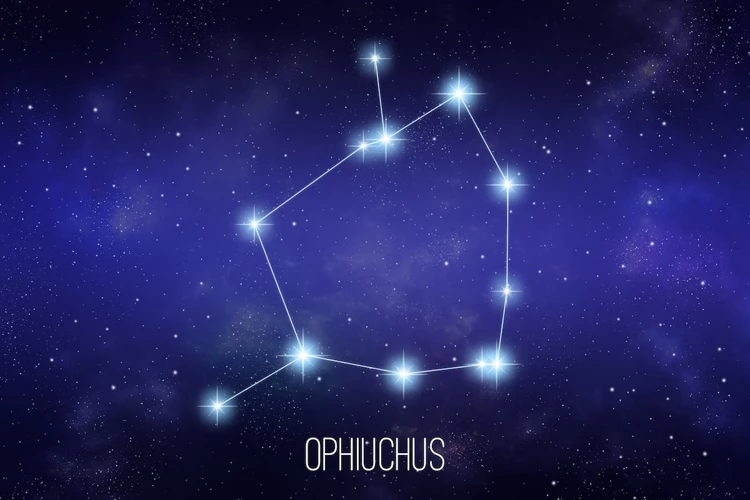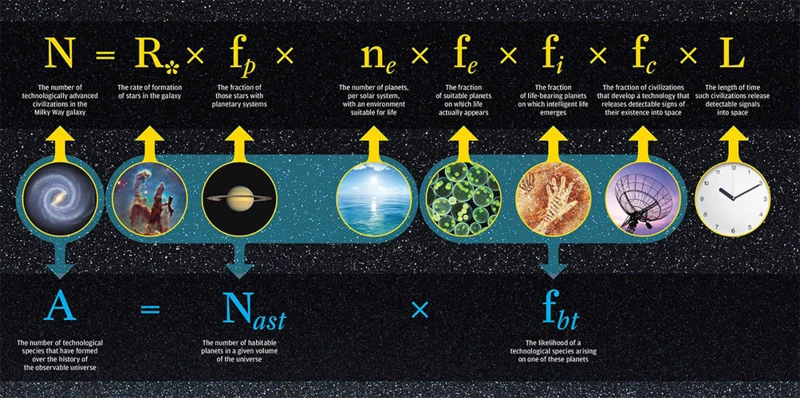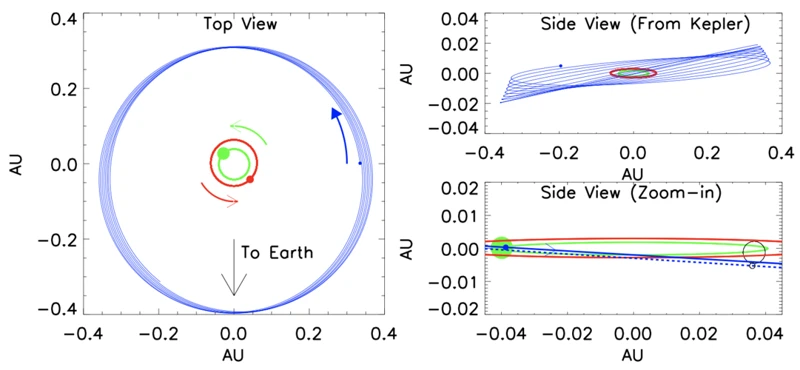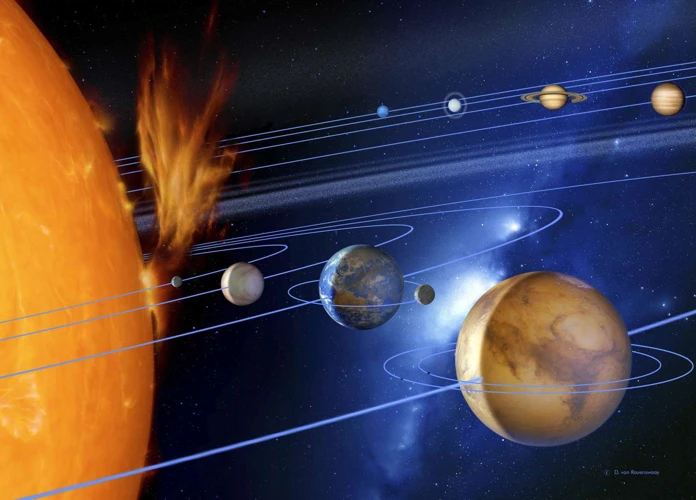Struck by the enigmatic nature of life’s unpredictable twists and turns, humans have long sought ways to make sense of the chaos. Enter planetary transits, a branch of astrology that delves into the cosmic movements of celestial bodies and their influence on major life events. While the concept might bewilder skeptics, there exists a vast pool of believers who attribute the unfolding of significant moments to the interplay of planets. This article aims to shed light on the role of planetary transits in predicting important milestones and unravel the methods used to decipher their effects. Brace yourself for a celestial journey that intertwines the tangible and the intangible, offering a unique perspective on the mysteries of life.
Understanding Planetary Transits

Planetary transits form the basis of astrological practices, providing insights into the movement and alignment of celestial bodies in relation to an individual’s birth chart. Understanding planetary transits involves grasping the concept of how these motions impact various aspects of life. Each planet carries its unique energy and symbolism, and as they move through the zodiac, they form aspects with other planets and sensitive points in an individual’s chart. These aspects serve as cosmic messages, triggering potential events and influencing personal dynamics. It is through a deep comprehension of planetary transits that astrologers can discern the potential themes and possibilities that may emerge during specific periods of time. By studying the shifts and interactions of these celestial bodies, astrologers decipher patterns and themes that shape our lives. These insights offer glimpses of the underlying cosmic forces that guide our personal growth, relationships, career trajectories, and overall well-being. Exploring the intricacies of planetary transits opens a doorway to a greater understanding of the cosmic interplay and the celestial symphony that governs our existence. To delve deeper into the effects of planetary transits, you can read our article on Planetary Transits and their Effects on the Zodiac.
The Significance of Major Life Events

Major life events hold tremendous significance as they shape the course of our existence, leaving lasting impacts on our personal development, relationships, careers, and well-being. These events mark pivotal moments of transformation, pushing us towards growth and self-discovery. Understanding the significance of major life events requires recognizing that they serve as milestones that propel us forward on our life’s journey. Birth and personal development, for instance, encompass the initial stages of life, where one’s character and identity begin to take shape. Relationships and partnerships play a vital role in providing love, support, and companionship, influencing our happiness and emotional well-being. Career and success encompass professional milestones, indicating the fulfillment of ambitions and aspirations. Health and well-being anchor our overall quality of life, as physical and mental well-being are essential for leading a fulfilling life. The occurrence of these major life events can be intertwined with the cosmic dance of planetary transits, which can provide deeper insights into the timing and potential outcomes of these significant moments. To explore further how planetary transits impact personal growth, you can refer to our article on Planetary Transits and Personal Growth in Astrology.
1. Birth and Personal Development
When it comes to , planetary transits play a crucial role in shaping an individual’s life journey. The positions of the planets at the time of birth lay the foundation for one’s personality traits, strengths, and potential challenges. However, it is through the ongoing transits that our lives continue to evolve and grow. As the planets move through different signs and form aspects with our natal planets, they activate certain energies and themes in our lives, influencing our personal development. For example, the transit of Jupiter, known as the planet of expansion and opportunity, can bring forth periods of personal growth and abundance. On the other hand, challenging transits from planets like Saturn or Pluto may present obstacles and lessons that propel us toward growth and transformation. Understanding these planetary transits allows us to navigate our journey with a deeper awareness of the cosmic forces at play. To explore how planetary transits affect our relationships, you can read our article on Relationship Astrology and Planetary Transits.
2. Relationships and Partnerships
In the realm of astrology, the influence of planetary transits on relationships and partnerships is of paramount importance. When it comes to relationships and partnerships, planetary transits can signify significant shifts and developments. For example, the transit of Venus, the planet of love and harmony, can bring about opportunities for romance, deep connections, and harmonious partnerships. On the other hand, challenging aspects from malefic planets like Mars or Saturn may indicate periods of conflict, obstacles, or even separations.
Transits of outer planets such as Uranus, Neptune, and Pluto tend to have a transformative impact on relationships. These transits can trigger profound shifts in the dynamics, leading to radical transformations or breakthroughs. For instance, the transit of Uranus may bring unexpected changes or unconventional relationships, while the transit of Pluto can bring intense power dynamics or a need for deep psychological and emotional transformation within partnerships.
It is essential to consider both individual charts and the composite chart – a chart that represents the energy of a relationship – when analyzing planetary transits and relationships. By examining the aspects formed between transiting planets and points in the individual or composite chart, astrologers can gain insights into the potential challenges and opportunities that relationships may encounter during specific periods.
Understanding and interpreting planetary transits in relationships allows individuals to navigate the ebb and flow of partnerships wisely. It provides a broader perspective on the evolution of relationships, helping individuals make conscious choices, cultivate healthy communication, and embrace the transformative energy that may arise. To explore more about the connection between planetary transits and relationships, feel free to read our article on Relationship Astrology and Planetary Transits.
3. Career and Success
When it comes to the realm of career and success, planetary transits play a significant role in shaping our professional journey. The movements of the planets can have a profound impact on our ambition, drive, and opportunities in the workplace. Career and success are areas of life where certain planetary transits can signify pivotal moments and shifts in our professional trajectory. For example, the transit of Jupiter, the planet of expansion and abundance, can bring forth opportunities for career growth and advancement. Its favorable aspects to our natal planets can signify periods of professional success and recognition. On the other hand, challenging transits from Saturn may bring obstacles and lessons that can ultimately lead to a stronger professional foundation. The transit of Uranus, known for bringing sudden and unexpected changes, can also influence career paths by introducing unconventional opportunities or prompting a desire for greater freedom and authenticity in our work. By understanding the planetary transits that directly affect our career sector, individuals can prepare for and leverage these energies to make informed decisions and seize advantageous opportunities. Embracing the cosmic dance of planets in relation to our professional lives allows us to navigate the twists and turns of our careers with greater insight and awareness.
4. Health and Well-being
When it comes to the role of planetary transits in predicting major life events, the domain of health and well-being holds significant importance. Planetary transits can provide astrological insights into potential health issues, opportunities for healing, and overall well-being. Certain transits may highlight periods of increased energy and vitality, while others may indicate periods of vulnerability or caution. For instance, the transit of Mars can symbolize increased physical energy, but if it forms challenging aspects, it could also suggest the potential for accidents or injuries. Similarly, the transit of Saturn can represent lessons and challenges that affect one’s physical and emotional well-being. If Saturn forms a harmonious aspect, it can indicate a time of discipline and commitment to health routines. On the other hand, if Saturn forms a stressful aspect, it might signify a period of sluggishness or increased susceptibility to stress-related conditions. It is crucial to understand that while planetary transits offer valuable insights, they are not deterministic. They serve as guideposts, encouraging individuals to take proactive measures for their health and well-being. By staying attuned to the energies reflected in the planetary transits, individuals can make conscious choices regarding lifestyle, self-care, and seeking appropriate medical advice when necessary. It is always advisable to consult healthcare professionals for any concerns or health-related issues.
The Role of Planetary Transits in Prediction

1. Astrological Transits Defined: Astrological transits refer to the movement of planets as they make aspects to the planets and points in an individual’s birth chart. These transits are seen as symbolic messages from the cosmos, reflecting potential energies and events that may manifest in a person’s life. By analyzing the planetary transits, astrologers gain insight into the themes and influences that are likely to impact an individual during a specific period.
2. Identifying Significant Transits: Not all planetary transits hold equal significance. Astrologers use various techniques to identify the most impactful transits based on factors such as the planets involved, the aspects formed, and the houses activated in the birth chart. Major transits include conjunctions, oppositions, squares, and trines, among others. The timing and intensity of these transits can vary, and their effects can be felt months or even years in advance. As astrologers examine the ebb and flow of planetary movements, they pinpoint the key transits that are likely to shape major life events and experiences.
3. Interpreting the Transits’ Effects: Interpreting the effects of planetary transits requires a deep understanding of astrology and its symbolism. Astrologers analyze the unique combination of planets involved in a transit, their aspects with other planets and points, and the corresponding houses in the birth chart. These factors provide vital clues about the possible outcomes and experiences associated with a transit. The interpretations can vary depending on the individual’s birth chart and the overall context in which the transit occurs. With experience and knowledge, astrologers intuitively blend the cosmic energies to offer nuanced insights into the potential effects of specific transits.
The role of planetary transits in prediction is to provide astrologers with a tool to anticipate and interpret major life events. By defining astrological transits, identifying significant ones, and interpreting their effects, astrologers can offer guidance and insights into the potential themes and experiences that individuals may encounter during specific periods of time. It is through this understanding and analysis of planetary transits that astrology becomes a valuable tool for predicting and navigating the twists and turns of life.
1. Astrological Transits Defined
Astrological transits refer to the movement of planets as they make aspects to the planets and sensitive points in an individual’s birth chart. These transits serve as a dynamic and ever-changing backdrop that influences different areas of life. To understand astrological transits, it is essential to grasp the concept of a birth chart, which is a map of the positions of the planets at the time of an individual’s birth. The birth chart acts as a blueprint that reflects one’s unique personality traits, strengths, and challenges. When planets in the sky form significant aspects with the planets in the birth chart, they activate certain energies and themes that can manifest in life events and experiences. For example, if Mars in the sky is making a conjunction aspect with an individual’s natal Venus, it may indicate a period of heightened passion and intensity in relationships. Similarly, if Jupiter is squaring an individual’s natal Sun, it may signify a time of expansion and growth in personal identity and self-expression. Astrological transits are not deterministic but rather provide a cosmic weather forecast, presenting opportunities and challenges that can be harnessed or navigated accordingly. Understanding and interpreting these transits are crucial for predicting major life events and gaining insights into the broader tapestry of one’s life journey.
2. Identifying Significant Transits
Identifying significant transits is a crucial step in predicting major life events through astrology. It involves analyzing the precise movements and aspects formed by the planets in relation to a person’s birth chart. Here are some key factors to consider when identifying significant transits:
1. Outer Planet Transits: Outer planets such as Uranus, Neptune, and Pluto have longer orbital periods, leading to more profound and transformative effects when they make aspects with sensitive points in the birth chart. These transits often coincide with major life events and personal transformations.
2. Stelliums and T-Squares: Stelliums occur when three or more planets gather in close proximity to each other in a particular sign or house. These alignments can herald significant shifts and concentrated energies in specific areas of life. T-Squares, on the other hand, involve three planets forming a right-angle aspect, creating tension and triggering transformative events.
3. Retrospective Transits: Retrograde motion occurs when a planet appears to move backward from our perspective on Earth. Retrograde transits tend to bring introspection, reassessment, and revisit unresolved matters. They can provide valuable insights into past events and have a profound impact on present circumstances.
4. Angular Transits: Angular transits occur when a planet aligns with one of the four angles of the birth chart: the Ascendant, Descendant, Midheaven, or IC (Imum Coeli). These transits tend to have a more immediate and tangible impact, often marking pivotal moments in life.
5. Planetary Conjunctions: Conjunctions involve two or more planets coming together in the same sign and degree, intensifying their combined energy. Conjunctions can have both positive and challenging effects, depending on the planets involved and the aspects they make in the birth chart.
Identifying these significant transits requires a comprehensive understanding of astrology and the specific dynamics of an individual’s chart. It is through careful analysis and interpretation that astrologers can pinpoint the periods when major life events and transformations are likely to occur.
3. Interpreting the Transits’ Effects
Interpreting the effects of planetary transits is a crucial aspect of astrology. It involves analyzing the significance of the planetary movements and their interactions with an individual’s birth chart. Each transit carries its own unique energy and symbolism, and it is through interpretation that astrologers uncover the potential impact on different areas of life. This process requires a deep understanding of the planetary symbolism, the specific aspects formed, and how they correspond to the individual’s chart. As transits occur, astrologers examine the house placements, the planets involved, and the aspects they create to decipher their potential effects. For example, a transit of Jupiter to the natal Venus may bring about opportunities for love, relationship growth, and increased harmony. However, interpretations are not solely based on individual transits; the overall context of the birth chart and the individual’s current life circumstances are considered to provide a comprehensive analysis. It is important to remember that the interpretation of transits is not deterministic; rather, it offers insights into potential themes, challenges, and opportunities that may arise during a specific period. Astrologers use their knowledge and experience to guide individuals in navigating these celestial currents and making informed choices. By understanding and interpreting the effects of transits, individuals gain a greater awareness of the cosmic influences shaping their lives and are better equipped to embrace the changes and challenges that lie ahead.
Tools and Techniques for Predicting Transits

When it comes to predicting planetary transits, astrologers utilize an array of tools and techniques to decipher the cosmic movements and their potential effects. One of the fundamental tools in this realm is the birth chart, also known as the natal chart. This chart serves as a personal celestial snapshot that outlines the positions of planets at the time of an individual’s birth. By analyzing the birth chart, astrologers can identify the current and upcoming transits that will interact with specific points in the chart, indicating potential life events or shifts in various areas. Another valuable resource for predicting transits is an ephemeris, which is a table or almanac that displays the exact positions of planets at specific dates and times. Ephemerides allow astrologers to track the movements of planets over time and determine when significant transits will occur. With advancements in technology, astrological software and apps have become popular tools for predicting transits. These programs often include features that calculate and display the transits for a given period, providing astrologers with a comprehensive view of the cosmic influences. While these tools offer valuable insights, it is important to note that interpreting and predicting transits require a deep understanding of astrology and its intricate nuances. Seeking professional astrological guidance can provide further clarity and interpretation of complex transit patterns. By combining these tools and techniques, astrologers can navigate the celestial landscape and uncover the potential impact of planetary transits on various aspects of life.
1. Birth Charts and Natal Astrology
When it comes to predicting planetary transits and their impact on major life events, birth charts and natal astrology serve as the foundation. A birth chart is a map of the sky at the exact moment of an individual’s birth, showing the positions of the planets and astrological signs on the zodiac wheel. It provides valuable insights into an individual’s personality traits, strengths, weaknesses, and potential life experiences. With the help of a birth chart, astrologers can determine the planetary placements and angles, known as aspects, which reflect the dynamics and patterns that shape a person’s life journey. Natal astrology, on the other hand, is the practice of interpreting the birth chart to gain a deeper understanding of an individual’s unique attributes and how they may interact with current and future planetary transits. By analyzing the planetary positions in the birth chart and comparing them to the current positions of the planets, astrologers can identify significant transits that may impact various areas of life. Natal astrology allows for a personalized approach, providing specific and tailored insights into the potential outcomes of planetary transits for an individual. It serves as a powerful tool for predicting major life events, offering guidance and understanding as individuals navigate through significant milestones, challenges, and opportunities.
2. Ephemeris and Planetary Positions
To accurately predict and interpret planetary transits, astrologers rely on ephemeris and planetary positions. An ephemeris is a tabular representation of celestial bodies’ positions in the sky at different points in time. It provides detailed information on planetary movements, including their exact zodiacal coordinates, degrees, and aspects. This invaluable tool allows astrologers to pinpoint the precise timing of planetary transits and their corresponding effects. By consulting an ephemeris, practitioners can determine when significant celestial events will occur, such as a planet’s ingress into a new sign or its alignment with other planets. They can also calculate the duration of these transits, helping individuals understand the potential timeline and influence of specific planetary movements in their lives. Additionally, ephemeris data aids in identifying retrograde periods when planets appear to move in a backward motion. This phenomenon often signifies a reevaluation or introspective phase in the areas of life associated with the retrograding planet. By keeping track of planetary positions through ephemeris tools, astrologers can accurately map out the celestial landscape and decipher the cosmic messages conveyed by the changing planetary dynamics.
3. Astrological Software and Apps
When it comes to predicting and understanding astrological transits, the use of astrological software and apps has become increasingly popular. These technological tools provide astrologers and enthusiasts with a convenient and efficient way to calculate and interpret planetary positions, aspects, and transits. Here are some benefits and features of using astrological software and apps:
1. Accurate Calculations: Astrological software uses complex algorithms and ephemeris data to calculate precise planetary positions and transits. This ensures accuracy in predictions and interpretations, saving time and effort.
2. Chart Generation: These tools generate birth charts and transit charts effortlessly, allowing users to input birth details and generate comprehensive charts with just a few clicks. The charts provide visual representations of planetary positions, aspects, and transits.
3. Transit Tracking: Astrological software enables users to track and monitor current and future planetary transits. This feature helps in identifying significant transits that may impact various areas of life.
4. Customization: Many software and apps offer customization options, allowing users to tailor their interpretations based on specific astrological traditions, techniques, and theories.
5. Additional Features: Some astrological software and apps provide additional features, such as daily horoscopes, interpretive reports, and compatibility analysis. These features can enhance the astrological experience and provide valuable insights.
6. Mobile Accessibility: With the availability of astrological apps, practitioners can access on-the-go astrological tools and resources directly on their mobile devices. This enables easy access to birth charts, transit information, and astrological analysis anytime, anywhere.
Astrological software and apps have become indispensable tools for both professional astrologers and astrology enthusiasts. They offer a user-friendly interface, accurate calculations, and a wide range of features that facilitate the study and interpretation of planetary transits. While astrological software and apps are valuable aids, it is essential to combine them with a deep understanding of astrological principles and techniques to ensure accurate and insightful predictions.
4. Seeking Professional Astrological Guidance
When it comes to navigating the intricate realm of planetary transits and their implications, seeking professional astrological guidance can be a wise choice. Seeking professional astrological guidance offers the opportunity to tap into the expertise of seasoned astrologers who possess a deep understanding of celestial patterns and their impact on individual lives. These professionals have dedicated years to studying astrology and honing their skills in interpreting planetary transits. By consulting with an astrologer, individuals gain access to valuable insights and personalized predictions tailored to their unique birth charts. These professionals have a wealth of knowledge and experience in deciphering the intricate language of the stars and planets, helping seekers make sense of the upcoming transits and their potential effects. Whether it’s gaining clarity about a major life event, seeking guidance on love and relationships, career choices, or overall well-being, a professional astrologer can provide invaluable perspectives and advice. They can shed light on the significance of specific transits, help individuals prepare for the challenges or opportunities that lie ahead, and offer strategies for harnessing the cosmic energies to their advantage. Engaging with a professional astrologer goes beyond esoteric readings; it offers a supportive and empowering experience that aims to assist individuals in navigating life’s complexities. So, if you crave a deeper understanding of the role of planetary transits in your life and desire personalized guidance, consider seeking the expertise of a professional astrologer. Their wisdom and insights may prove to be transformative as you journey through the cosmic dance of life.
Case Studies: Real-life Examples
Case studies provide tangible evidence of the role of planetary transits in predicting major life events. These real-life examples serve as testimonials to the power and accuracy of astrological insights. Let’s explore a few case studies to understand how planetary transits played a significant role in individuals’ lives.
Case Study 1: John’s Career Shift
During a particular transit period, John experienced a series of challenging aspects involving his natal planets and the transiting planets. Astrologers identified a rare alignment indicating a transformative career shift. With this insight, John made the courageous decision to leave his stable job and pursue his entrepreneurial dreams. The cosmic guidance provided by planetary transits gave him the confidence to take the leap, ultimately leading to a successful business venture.
Case Study 2: Sarah’s Relationship Journey
Sarah had been longing for a fulfilling romantic relationship but had been unsuccessful in finding a genuine connection. After consulting with an astrologer, she discovered that a significant transit was approaching her natal Venus, which symbolizes love and relationships. During this transit, she became more open to opportunities and met her soulmate. The astrological guidance Sarah received helped her navigate through the cosmic currents and find love.
Case Study 3: Jennifer’s Health Struggles
Jennifer had been battling chronic health issues for years, with no improvement despite medical interventions. Upon analyzing her birth chart and current transits, astrologers noted a challenging aspect affecting her health-related houses. This insight prompted Jennifer to explore alternative healing modalities, leading her to a holistic approach that brought about significant improvements in her well-being. Planetary transits provided Jennifer with a holistic perspective on her health struggles and guided her towards the right path of healing.
These diverse case studies highlight the transformative and predictive power of planetary transits. They demonstrate how astrology, when applied skillfully, can offer valuable insights into major life events and contribute to personal growth, relationship dynamics, career endeavors, and overall well-being. The experiences of individuals in these case studies serve as compelling evidence for the potential impact of planetary transits on our lives.
Conclusion
In conclusion, exploring the role of planetary transits in predicting major life events offers a unique perspective on the interconnectedness of the cosmic and human realms. The understanding of planetary transits allows astrologers to decipher the potential themes and possibilities that may unfold during specific times in an individual’s life. By studying the movements and alignments of celestial bodies, astrologers gain insights into personal growth, relationships, career trajectories, and overall well-being. Birth charts, ephemeris, and astrological software serve as valuable tools in this journey of exploration, providing accurate data for predicting and interpreting transits. Additionally, seeking professional astrological guidance can offer deeper insights and personalized interpretations. Real-life case studies exemplify the power of planetary transits in shaping significant events. While skeptics may remain unconvinced, for believers, the study of planetary transits provides a fascinating avenue for understanding the mysteries of life. Whether you view astrology as a science or a spiritual endeavor, the role of planetary transits remains an intriguing subject that invites contemplation and opens doors to self-discovery. Embracing the celestial dance of the planets, we embark on a journey that merges the tangible and intangible, offering glimpses into the grand design of the universe and our place within it.
Frequently Asked Questions
1. How do planetary transits influence our lives?
Planetary transits are believed to influence our lives by bringing forth new opportunities, challenges, and experiences that align with the energetic themes of the planets involved. They can trigger significant events, personal growth, shifts in relationships, career advancements, and changes in our overall well-being.
2. Can planetary transits predict specific events?
While planetary transits can offer insights into the potential themes and energies we may encounter during specific periods, they do not predict specific events with certainty. Instead, they provide a framework for understanding the possible influences and opportunities that could manifest during a particular transit.
3. How long do planetary transits last?
The duration of planetary transits can vary significantly depending on the planet involved, its speed, and the aspects it forms. Some transits can last a few days, while others can span several months or even years.
4. Can we interpret planetary transits without knowledge of astrology?
Interpreting planetary transits can be challenging without a basic understanding of astrology. However, seeking guidance from professional astrologers or using astrological software and apps can help in interpreting the effects of these transits.
5. Do all planetary transits have the same impact on everyone?
No, the impact of planetary transits varies from person to person based on the unique birth chart and the individual’s life circumstances. The aspects formed between the transiting planets and the natal planets in an individual’s chart determine the specific influence of a transit.
6. Are some planetary transits considered more significant than others?
Yes, certain planetary transits are considered more significant due to their long-lasting effects or their alignment with key points in an individual’s chart, such as the Sun, Moon, or Ascendant. These transits often signify major life events or turning points.
7. Can we prepare for the effects of planetary transits?
While we cannot fully control or prevent the effects of planetary transits, understanding them can help us navigate and make conscious choices during significant periods. Self-reflection, mindfulness, and seeking insight from astrology can assist in preparing for the potential shifts brought on by these transits.
8. Do planetary transits override free will?
No, planetary transits do not override free will. Instead, they reflect the energies available to us, presenting us with opportunities and challenges. How we choose to embrace or respond to these influences is ultimately up to us.
9. Can we experience the effects of multiple planetary transits simultaneously?
Yes, it is possible to experience the effects of multiple planetary transits simultaneously. This can create a complex interplay of energies and themes, which may manifest in different areas of life simultaneously.
10. Are planetary transits the only factors astrologers consider when predicting major life events?
No, astrologers consider a combination of factors, including planetary transits, progressions, and aspects in an individual’s birth chart to predict major life events. These multiple layers of analysis provide a more comprehensive understanding of the potential influences at play.








